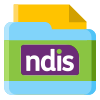This plan will describe what the behaviour looks like, what triggers the behaviour, if known, and strategies to manage the behaviour.A behaviour management plan will outline strategies to avoid the behaviour escalating to the next level. The plan will also identify if the client is on any PRN medications for behaviour management and under what circumstances those medications can be used.
This document is most commonly, written by a behaviour clinician. A person who knows the client well can also help write the plan. This, document forms an important role in informing a support worker on exactly how to manage and avoid potential incidents due to a client’s challenging behaviour. Even some of the most difficult clients can be well managed when the behaviour supports are followed consistently by all carers. Behaviours are a response to a situation. They are a form of communication. This can be frustration, being told they cannot do something, I don’t understand what you are asking from me, being scared, and many other possible options.

This plan will describe what the behaviour looks like, what triggers the behaviour, if known, and strategies to manage the behaviour.A behaviour management plan will outline strategies to avoid the behaviour escalating to the next level. The plan will also identify if the client is on any PRN medications for behaviour management and under what circumstances those medications can be used.

This plan will describe what the behaviour looks like, what triggers the behaviour, if known, and strategies to manage the behaviour.A behaviour management plan will outline strategies to avoid the behaviour escalating to the next level. The plan will also identify if the client is on any PRN medications for behaviour management and under what circumstances those medications can be used.
This document is most commonly, written by a behaviour clinician. A person who knows the client well can also help write the plan. This, document forms an important role in informing a support worker on exactly how to manage and avoid potential incidents due to a client’s challenging behaviour. Even some of the most difficult clients can be well managed when the behaviour supports are followed consistently by all carers. Behaviours are a response to a situation. They are a form of communication. This can be frustration, being told they cannot do something, I don’t understand what you are asking from me, being scared, and many other possible options.

When a new carer can read a plan and understand what the client is feeling and trying to communicate then it becomes a lot easier for the carer to accept and understand that the behaviours are often not personal and that they are trying to in fact actually communicate with you. Having a comprehensive Behaviour Management plan that consistently is followed by all carers makes the process of supporting a client with challenging behaviours a much more pleasant task and having carer’s who understand the client and their needs makes the time spent together a lot less stressful for all concerned.
Like with all plans if a client is asking for supports through their NDIS plan for Behaviour Support then data collection and supporting documentation will be required to support the claim. (Such as ABC Charts, incident reports, Psychologists reports, shift reports, medication charts, PRN medication protocols etc). This data must outline the impact the challenging behaviours are having on the client, the family and support staff. (E.g. a client may not be able to participate fully in the community due their behaviours.).

they are trying to in fact actually communicate with you. Having a comprehensive Behaviour Management plan that consistently is followed by all carers makes the process of supporting a client with challenging behaviours a much more pleasant task and having carer’s who understand the client and their needs makes the time spent together a lot less stressful for all concerned.
Like with all plans if a client is asking for supports through their NDIS plan for Behaviour Support then data collection and supporting documentation will be required to support the claim. (Such as ABC Charts, incident reports, Psychologists reports, shift reports, medication charts, PRN medication protocols etc). This data must outline the impact the challenging behaviours are having on the client, the family and support staff. (E.g. a client may not be able to participate fully in the community due their behaviours.).
We can assist you with all your case management needs and can help you maxmize your funding you receive from your NDIS Plan

In the event of a medical emergency a client’s care plans and case management form an excellent resource for medical staff to treat a client. The care plans outline what care a client is currently receiving and a client’s medical history.

Plans document what treatments have been implemented for a client both their current interventions as well as past interventions. This assists medical and other specialists in determining a treatment plan for the client. It informs them on what worked for the client previously and what has not worked.

By having the client’s care requirements documented it also provides the information to medical and other specialists on the other treatments a client may be receiving from another specialist. This means that all specialists are working collaboratively to provide the best quality of care for the client.

The care plans and data collection process are an excellent source of information that can be provided as supporting evidence for a claim under a client’s NDIS Plan.

It outlines the client’s current care requirements. It informs care staff on what conditions the client has and how they need to manage the client’s care.
